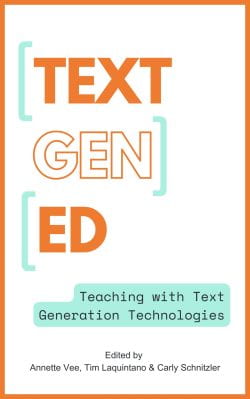Spring Faculty Book Club: Teaching with A.I.
 Are you interested in learning more about generative A.I. and integrating these tools into your classes? Join the TU Writing Center staff and faculty from across campus to read and discuss TextGenEd: Teaching with Text Generation Technologies, edited by Vee, Laquintano, and Schnitzler (2023). Participants will enroll in a Blackboard Community, where we will have opportunities to ask questions and share thoughts about sample assignments, with the goal of trying out one or more of the assignments in a writing-intensive class. At the book club meeting in April, we will gather in person or on zoom to share experiences integrating A.I. assignments and talk about how to adapt our teaching practices for this new context.
Are you interested in learning more about generative A.I. and integrating these tools into your classes? Join the TU Writing Center staff and faculty from across campus to read and discuss TextGenEd: Teaching with Text Generation Technologies, edited by Vee, Laquintano, and Schnitzler (2023). Participants will enroll in a Blackboard Community, where we will have opportunities to ask questions and share thoughts about sample assignments, with the goal of trying out one or more of the assignments in a writing-intensive class. At the book club meeting in April, we will gather in person or on zoom to share experiences integrating A.I. assignments and talk about how to adapt our teaching practices for this new context.
Download the book for free here: https://wac.colostate.edu/repository/collections/textgened/
Book club will begin on Monday, February 26. Participation in the community discussion will be asynchronous. The hybrid meeting is scheduled for Thursday, April 25, 3:00pm-4:30pm.
Participants in this hybrid program will have opportunities to discuss sample assignments designed to teach students how to use artificial intelligence tools, with an emphasis on ethical concerns. While participating faculty are not required to try out any assignments during the spring semester, those who wish to do so will have a supportive group to share ideas and concerns with. At the end of the term, we will meet to share responses and reflections.
Blackboard Community Opens: February 26, 2024
Meeting (in person or on zoom): Thursday, April 25, 3-4:30 pm
RSVP Here: Writing Center Book Club Registration Form
Refreshments will be provided for in-person attendees.
More about the book selection from WAC Clearinghouse:
Generative AI is the most influential technology in writing in decades—nothing since the word processor has promised as much impact. Publicly-accessible Large Language Models (LLMs) such as ChatGPT have enabled students, teachers, and professional writers to generate writing indirectly, via prompts, and this writing can be calibrated for different audiences, contexts and genres. At the cusp of this moment defined by AI, TextGenEd collects early experiments in pedagogy with generative text technology, including but not limited to AI. The fully open access and peer-reviewed collection features 34 undergraduate-level assignments to support students’ AI literacy, rhetorical and ethical engagements, creative exploration, and professional writing text gen technology, along with an Introduction to guide instructors’ understanding and their selection of what to emphasize in their courses. TextGenEd enables teachers to integrate text generation technologies into their courses and respond to this crucial moment.
Tags: A.I., Faculty, Pedagogy, Writing, Writing Center
Categorised in: General
This post was written by Barney, E. Mairin